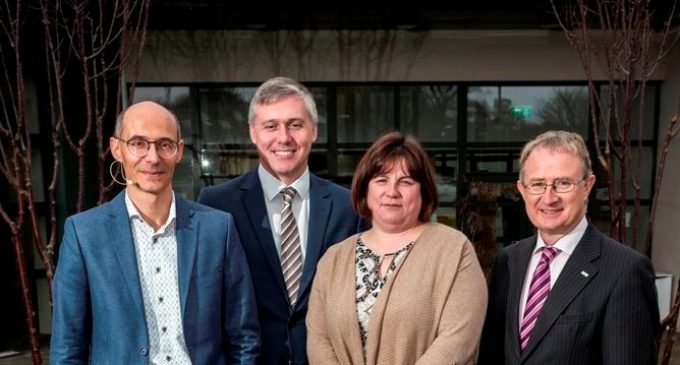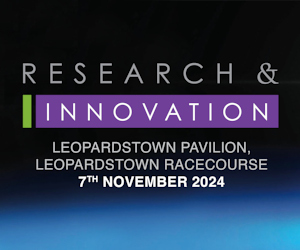Bridging Science and the Consumer: Key Market Trends and Implications For the Irish Food Industry

Market experts, research scientists and industry commentators met recently at a joint Bord Bia-Teagasc conference to discuss how science is responding to key market trends, and wider policy issues such as climate change. Welcoming participants to the conference, Teagasc Director of Research Professor Frank O’Mara said: “At any one time, Teagasc runs about 370 research projects, with a total expenditure of about €65 million per annum coming mainly from DAFM but also other funders such as SFI, EU, and industry. We strive to ensure our work is responsive to evolving market demands to supports the development of the agricultural and food industries in Ireland. We are also conscious of our role as a public sector body to contribute to informed discussion in complex, contested and sometimes misinformed debates with regards to agriculture and food.”
Bord Bia’s Padraig Brennan said: “Bord Bia is involved in a continuous process of engaging with consumers in the market place. We are very pleased to share this knowledge and insight with scientists and policy makers, as well as industry, so that we can continue to produce high quality, sustainable food for 180 countries globally. As we work to further enhance the reputation of Irish food and drink, science has a key role to play both in terms of providing robust evidence of our credentials, and ensuring that the sector continues to innovate, both in terms of product and technology, to meet the ever evolving needs of the marketplace.”
Grace Binchy from Bord Bia set the scene on the key global trends and the macro forces of change that will influence how consumers lives are evolving. With a particular emphasis on health, sustainability and changing consumer identity, Grace Binchy outlined some of the key challenges and opportunities that the food and drinks industry will need to consider to ensure it remains relevant while addressing the needs of the consumer of tomorrow.
Keynote speaker Professor Wim Verbeke, from Ghent University, who spoke about consumer food choice behaviour with a focus on alternative proteins, said: “Consumers continue to have increasing expectations with regards to the food they consume and need reassurance in relation to perceived risks, while caring more than ever before about health and sustainability. These risks and challenges are changing over time as alternative protein sources and new foods, such as insects or cultured meat, are developed, and initial reactions to such products may change as consumers weigh up perceived benefits and risks, from a personal as well as wider societal perspective.”
Rory McDonnell from Bord Bia, highlighting the link between protein and functional foods, said: “Consumer expectations around protein offers are higher than ever, so the label of ‘protein’ itself requires some kind of added value; alone it is no longer enough.”
Professor Maeve Henchion from Teagasc highlighted the conflicting information that consumers are exposed to with regards to traditional sources of protein and spoke about the “contested space” in which food is now discussed. In addition to concerns about the impact of food production and consumption on climate change, others issues will come more to the fore in the future, for example animal health and welfare will become more important as concerns about antimicrobial resistance rise. She argued that science has an important role to play in contributing to a balanced, informed discussion and that social science needs to complement contributions from the physical and life sciences for scientific advancements to have significant impact.
Research scientist and nutritionist from Teagasc, Dr Sinéad McCarthy outlined the complexities and subtle nuances of achieving a sustainable and healthy diet. She spoke about the impact of removing food groups from our habitual diet and explained that food substitutions made to improve environmental credentials may not always result in a healthy diet.
Sarah Haire, representing the European Roundtable for Beef Sustainability, emphasised the importance for pre-competitive collaboration along the supply chain. She maintained that such collaboration will enable industry to play its part in contributing to the 50% increase in food production that will be required 2050, in a sustainable way, while protecting the natural and social environment.
Teagasc scientist Professor Paul Cotter spoke about scientific developments and new opportunities in relation to fermented foods. “Fermented foods have been produced and consumed for millennia but went out of favour for a while, especially in Western society. This has changed and current consumer perceptions of fermented foods as being natural and having significant health benefits have positioned them as a mega-trend in the market. Our research will separate the facts from the fiction, and show how harnessing of the microbes from these foods can generate fermented foods with ever further enhanced health-promoting features.”
For more information, please contact Professor Maeve Henchion (maeve.henchion@teagasc.ie) or Padraig Brennan (padraig.brennan@bordbia.ie).
CAPTION:
Wim Verbeke, Ghent University, with Padraig Brennan, Bord Bia; Sarah Haire, European Round Table for Beef Sustainability, and Frank O’Mara, Teagasc, at a joint Bord Bia-Teagasc conference to discuss how science is responding to key market trends, and wider policy issues such as climate change.







